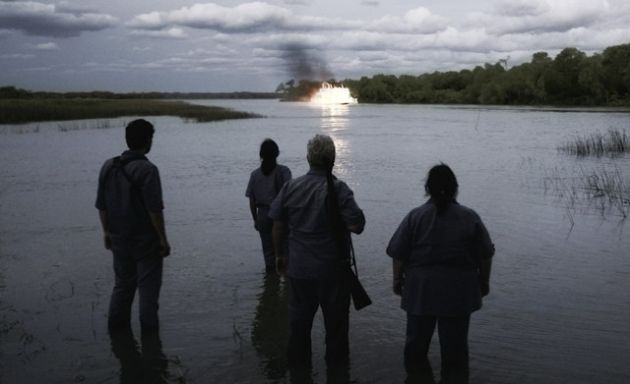
It's early morning. It starts with the lush landscape and the camera slowly pans to reveal a tranquil greenery. The opening of Parabellum reminds you of the opening scene of Carlos Reygada's Silent Light, except for imposing beat of electro music. You know something's gonna go down. Then a firebomb strikes down from the sky and the earth shakes, setting up the mood for the rest of the film.
In Lukas Valenta Rinner's Parabellum, the world is in turmoil - there are constant reminder of natural disasters, civil unrest on TV newscast and airwaves- "A tragic situation is developing in Argentina."
We focus on an unnamed man preparing for a journey: he quits his white color office job, drops off his cat at the pet shelter, checks on his old man at the nursing home and cancels his phone service. The whole sequence is briskly and impeccably arranged with much precision. He is going into the jungle to join a training camp designed for survival.
The camp looks like a cross between fancy eco-tourist lodge & military boot camp, equipped with a jacuzzi, pool, shooting range and staff who make beds and serve food. Ordinary looking men and women of all shapes and sizes, go through vigorous physical and theoretical training. Each morning, the compound makes an announcement through the loud speakers. Before their mandatory trainings at a set time, they can choose to take part in gardening, homemade explosives or camouflage classes.
The trainees who populate these compounds are obviously well off to be there, as if money can buy one's survival. But Rinner doesn't really linger on these trifles, for the film is, after initial chuckles, not a black comedy.
Almost free of dialog (other than formal instructions by the trainers) and divided in chapters according to the fictional "Book of Disasters", Parabellum's tone is somber and deadly serious. Nowhere is safe, the seemingly random strikes comes from the sky. Even into their camp grounds.
After the grueling, first initial training - hand to hand combat, weapons training, etc., the people are transferred by boat, to a more remote areas to train more. As the film progresses, it focuses on a handful of trainees.
The real violent act doesn't happen until after the training. After taking over somebody's house, they take up a boat. It becomes quite apparent that they would sail themselves back to the civilization. One of the younger, frail trainees seems to have a mental breakdown and lights himself and the boat on fire. But we have no idea why these people do what they do because the film provides little to no indication of what they think or feel. All we know is, most of the trainees are motivated to be prepared, to be ready for the worst.
Its minimalistic, wideshot approach and emotional muteness, Parabellum plays out like a Gus Van Sant directed post-apocalyptic film. With the spectacular reveal at the end, the film signals the arrival of a major talent emerging from Argentina.
Parabellum plays as part of ND/NF 2015 at MoMA on 3/23 and at FSLC on 3/24. Q&A with director Lukas Valenta Rinner will follow for both screenings. For more info, please visit ND/NF website.
Dustin Chang is a freelance writer. His musings and opinions on the world can be found at www.dustinchang.com